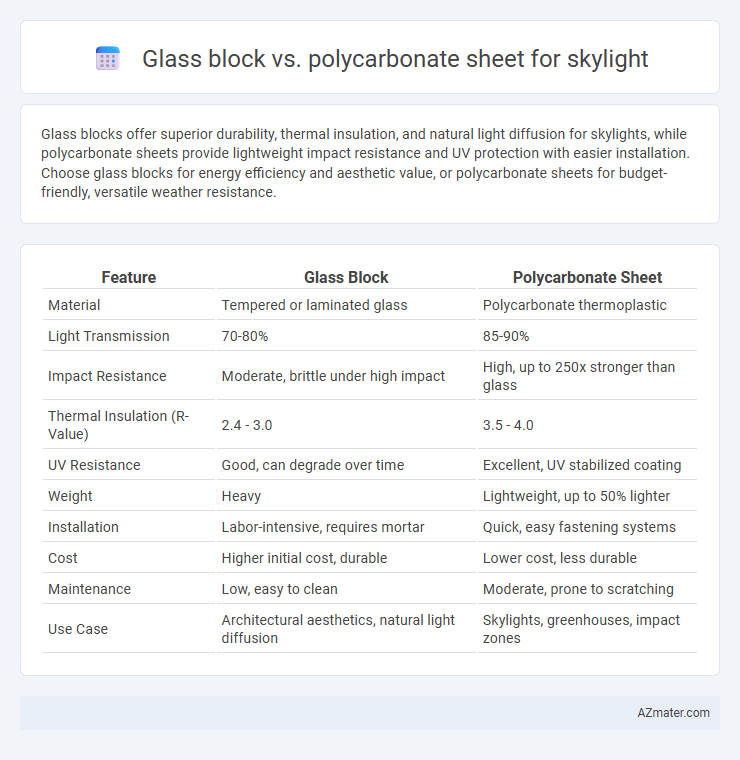Glass blocks offer superior durability, thermal insulation, and natural light diffusion for skylights, while polycarbonate sheets provide lightweight impact resistance and UV protection with easier installation. Choose glass blocks for energy efficiency and aesthetic value, or polycarbonate sheets for budget-friendly, versatile weather resistance.
Table of Comparison
| Feature | Glass Block | Polycarbonate Sheet |
|---|---|---|
| Material | Tempered or laminated glass | Polycarbonate thermoplastic |
| Light Transmission | 70-80% | 85-90% |
| Impact Resistance | Moderate, brittle under high impact | High, up to 250x stronger than glass |
| Thermal Insulation (R-Value) | 2.4 - 3.0 | 3.5 - 4.0 |
| UV Resistance | Good, can degrade over time | Excellent, UV stabilized coating |
| Weight | Heavy | Lightweight, up to 50% lighter |
| Installation | Labor-intensive, requires mortar | Quick, easy fastening systems |
| Cost | Higher initial cost, durable | Lower cost, less durable |
| Maintenance | Low, easy to clean | Moderate, prone to scratching |
| Use Case | Architectural aesthetics, natural light diffusion | Skylights, greenhouses, impact zones |
Introduction: Glass Block vs Polycarbonate Sheet for Skylights
Glass blocks provide excellent thermal insulation, durability, and aesthetic appeal, making them a popular choice for skylights that require enhanced privacy and classic design. Polycarbonate sheets offer superior impact resistance, lightweight installation, and UV protection, ideal for skylights in areas prone to harsh weather conditions or requiring maximum light transmission. Comparing thermal performance, durability, and cost efficiency helps determine the best material for specific skylight applications.
Material Composition and Structure
Glass blocks consist of two thick glass panels fused together with an air or gas-filled chamber in between, providing high rigidity and natural light diffusion ideal for skylights. Polycarbonate sheets are made from lightweight thermoplastic polymers with a multi-wall or solid structure, offering superior impact resistance and thermal insulation. The rigid material composition of glass blocks offers durability and aesthetic appeal, while polycarbonate's engineered structure enhances flexibility and shatterproof performance under various weather conditions.
Light Transmission and Diffusion
Glass blocks offer high light transmission with a natural daylight effect but tend to diffuse light more unevenly due to their textured surfaces, creating softer shadows and reduced glare. Polycarbonate sheets provide superior light transmission with up to 90% clarity and deliver uniform diffusion that minimizes glare and hotspots, making them ideal for consistent lighting conditions. Their lightweight and impact-resistant properties also enhance energy efficiency and durability in skylight applications.
Thermal Insulation Properties
Glass blocks provide strong thermal insulation due to their thick, dense structure that reduces heat transfer and maintains indoor temperature stability for skylights. Polycarbonate sheets offer moderate thermal insulation with lightweight construction and inherent UV protection, yet typically allow more heat conduction compared to glass blocks. Selecting glass blocks enhances energy efficiency by minimizing heat loss and gain, whereas polycarbonate sheets prioritize weight reduction and impact resistance alongside acceptable thermal performance.
Strength and Impact Resistance
Polycarbonate sheets exhibit superior impact resistance, with a tensile strength of approximately 70 MPa and the ability to withstand high-velocity impacts without cracking, making them ideal for skylights in areas prone to hail or debris. Glass blocks typically have a compressive strength around 20 MPa but are more brittle and prone to shattering under sudden impact. The inherent flexibility of polycarbonate sheets ensures enhanced durability and safety compared to the rigid, breakable nature of glass blocks in skylight applications.
Weight and Installation Requirements
Glass blocks typically weigh around 15 to 20 pounds per square foot, making them significantly heavier than polycarbonate sheets, which average between 0.5 to 1.5 pounds per square foot. The heavier weight of glass blocks necessitates stronger structural support and more complex installation procedures, including mortar setting and precise alignment. In contrast, polycarbonate sheets are lightweight, flexible, and require simpler mounting systems such as screws or clips, reducing labor time and overall installation costs for skylights.
Weather Resistance and Durability
Glass blocks provide excellent weather resistance with strong resistance to UV rays, temperature changes, and moisture, maintaining clarity and structural integrity over time. Polycarbonate sheets offer superior impact resistance and flexibility, allowing them to withstand high winds, hail, and heavy snow loads without cracking or breaking. Both materials are durable, but polycarbonate excels in toughness and shatter resistance while glass blocks deliver long-lasting rigidity and thermal insulation for skylights.
Aesthetic Appeal and Design Flexibility
Glass blocks offer a classic and refined aesthetic with their translucent, textured surfaces that diffuse natural light softly, making them ideal for traditional and elegant skylight designs. Polycarbonate sheets provide superior design flexibility due to their lightweight, moldable properties and availability in various colors and finishes, allowing for creative and modern skylight shapes. Both materials enhance daylighting, but polycarbonate's adaptability supports more complex architectural forms while glass blocks emphasize timeless visual appeal.
Maintenance and Longevity
Glass blocks offer superior scratch resistance and maintain clarity over decades with minimal cleaning, making them low-maintenance and highly durable for skylights. Polycarbonate sheets require more frequent cleaning to prevent discoloration and surface damage but provide excellent impact resistance and flexibility. Longevity for glass blocks often surpasses 50 years, while polycarbonate sheets typically last 10 to 20 years depending on UV protection and environmental conditions.
Cost Comparison and Value
Polycarbonate sheets offer a more cost-effective solution for skylights, with prices typically 30-50% lower than glass blocks, making them ideal for budget-conscious projects. Despite the higher initial investment, glass blocks provide superior durability, thermal insulation, and aesthetic appeal, contributing to greater long-term value and energy savings. The choice between the two depends on balancing upfront costs against maintenance, lifespan, and performance requirements for the specific application.

Infographic: Glass block vs Polycarbonate sheet for Skylight
 azmater.com
azmater.com